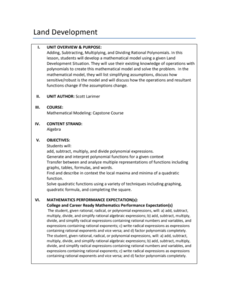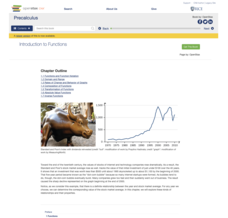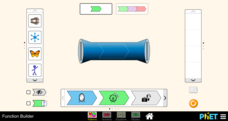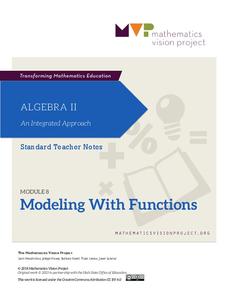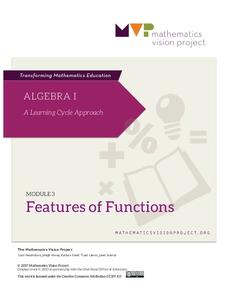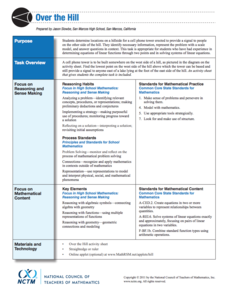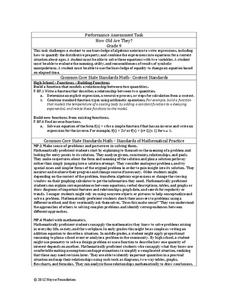Curated OER
Linear and Exponential Functions
This comprehensive unit on linear and exponential functions provides numerous clearly-written worksheets. Topics include graphing linear equations, solving systems of equations algebraically and by graphing, identifying the domain and...
Flipped Math
Unit 7 Review: Exponential Functions
Take a break from learning new information and take time to review. Scholars review the unit by completing some practice problems. They rewrite expressions using exponents, solve exponential equations, graph exponential functions,...
Mathalicious
Pandemic
Young scientists use exponential growth and logarithms to model how a virus spreads through a population. Pupils watch a news clip about the 2012 outbreak of Ebola. Scholars then manipulate inactive graphs to see how various factors...
Radford University
Calculating the Cost: Algebraic Planning for a First Car
Scholars decide which job to take based on the pay. They then research cars to potentially purchase and determine the total cost of the car. Finally, they calculate how long they would have to work to purchase the car along with how much...
Radford University
Land Development
Groups work with polynomials to devise functions that will model a selling price for property. The teams determine variables to create expressions to represent the cost required to develop land into a housing addition. Classmates then...
Rice University
Precalculus
Take a step beyond Algebra 2. Learners use the eBook to learn concepts from the typical Precalculus course. Content starts off with a short review of functions in general and moves on to the basic functions, finishing up with more...
PHET
Function Builder
Build confidence about functions with the function builder. Pupils learn about functions and transformations using an interactive. A function machine transforms pictures, numbers, and equations based on a function rule. A mystery...
CCSS Math Activities
Smarter Balanced Sample Items: High School Math – Target N
Let the resource be part of your lesson sequence. Learners work through eight questions given as part of a PowerPoint presentation in the Claim 1 Item Slide Show series. They must come up with functions for contextual situations and...
Mathematics Vision Project
Module 8: Modeling With Functions
Sometimes there just isn't a parent function that fits the situation. Help scholars learn to combine function types through operations and compositions. Learners first explore a new concept with an introductory activity and then follow...
Mathematics Vision Project
Module 3: Numbers and Operations
Bring some concrete reasoning to the skills of multiplying and combining terms. Using various strategies, the six activities in the module provide practice for the skills of adding, subtracting, multiplying, and diving polynomials. The...
Mathematics Vision Project
Module 3: Features of Functions
Learn how to represent functions in multiple ways. Learners analyze functions as equations, graphs, and verbal descriptions. The analysis includes intercepts, behavior, domain, and range. The module of seven lessons makes up the third...
101 Questions
Lunch
Traditional lamian, a noodle originating from China, is hand shaped by twisting, stretching, and folding the dough into strands. Scholars observe the technique before determining the length of the final noodle. They use exponential...
Kenan Fellows
Half-Life
Scholars shake their way to understanding half-life with the help of candy. They observe and record which side candy lands on to graph the exponential decay in the fifth lesson of seven integrating chemistry and algebra. Combining...
National Council of Teachers of Mathematics
Over the Hill
Can you hear me from there? Pupils determine the place to build a cell tower on a hill. The class uses constraints and creates a scale drawing on a coordinate system to calculate the exact location of the base of the cell tower.
CK-12 Foundation
Addition of Polynomials: Splitting into Tiles
Count on tiles to add polynomials. Pupils drag virtual algebra tiles onto colored mats to represent the sum of two polynomials. The learners count the number of like tiles to find the coefficient of each term. They finish...
CK-12 Foundation
Multiplication of Polynomials by Binomials: Rainbows
Is it possible to use the distributive property with several terms? Learners multiply a polynomial by a binomial using the same method as with a monomial. The scholars distribute each term of the binomial to each term in the polynomial...
CK-12 Foundation
Multiplying Polynomials: Binomial Cork Board
Cover the cork board with pictures of the house. The interactive provides pictures of a house to duplicate and cover a given area. The pictures' dimensions are expressed as binomials. Pupils determine the area of the cork board based...
CK-12 Foundation
Multiplication of Monomials by Polynomials: Distributing the Monomial
An interactive shows graphically the distribution of a monomial across all the terms in a polynomial multiplication problem. Pupils relate the specific example to a more general problem then make conclusions to develop a pattern for...
CK-12 Foundation
Multiplying Polynomials
Help your class find patterns in polynomial multiplication. Pupils multiply a trinomial by a binomial using a graphic organizer. They respond to questions about patterns observed in polynomial multiplication before a discussion question...
Mathematics Vision Project
Features of Functions
What are some basic features of functions? By looking at functions in graphs, tables, and equations, pupils compare them and find similarities and differences in general features. They use attributes such as intervals of...
PBL Pathways
Cell Phones
Calling all subscribers! Model revenue based on individual cell phone subscribers. The project-based learning activity presents a challenge to scholars from a cell phone company. Individuals model data provided to them from the company...
Inside Mathematics
How Old Are They?
Here is a (great) lesson on using parentheses! The task requires the expression of ages using algebraic expressions, including the distributive property. Pupils use their expressions to determine the individual ages.
EngageNY
End-of-Module Assessment Task - Algebra 2 (Module 3)
The last installment of a 35-part series is an assessment task that covers the entire module. It is a summative assessment, giving information on how well pupils understand the concepts in the module.
EngageNY
The Million Dollar Problem
Who wouldn't want to be a millionaire? The 34th installment of a 35-part module prompts young economists to calculate the monthly payments necessary to save a million dollars by age 40. As with car loans, annuity payments, and mortgages,...






